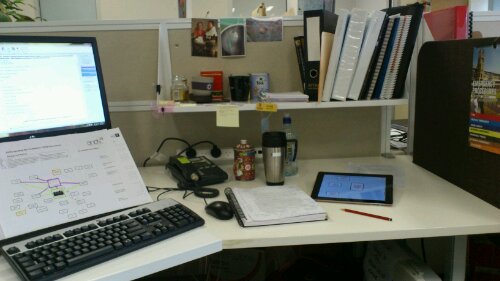Essential work tools
I tweeted today that IT at MPOW are having some trouble figuring out why dropbox won’t install on my work PC. Some background is needed. As I’ve recently changed teams I have been the lucky recipient of a long overdue new computer and I’m one of a handful of staff testing the Windows 7 environment that is to be rolled out as standard… er, soonish.
Dropbox installed fine on the old machine but something in the new configuration is stopping it. IT were able to get endnote to load and to get the system to allow me to designate Chrome as my default browser but dropbox is being problematic.
This led me to think about the tools I take for granted in my workday – dropbox definitely being one of them. Some are tech based, others not.
I use my (personal) iPad nearly every day at work, to take notes, monitor twitter via hootsuite, draw mindmaps using popplet, refer to annotated PDF documents, write meeting minutes or quickly look something up on the fly. From being initially very sceptical about the uses for the iPad I’ve become quite a convert!

I’ve just acquired the document holder you can see between keyboard & monitor in the photo & after a week I already cannot imagine how I got on without it.
I can’t imagine not having a couple of notebooks on the go at any one time. I love the iPad but sometimes I find there’s no substitute for physically writing it down. That said, I can never find a pen & have taken to haunting the stationery cupboard this week in anticipation of the monthly order delivery in case there’s new pens….
The new PC has come with OneNote loaded and I’m currently exploring its usefulness & capabilities – I’ll let you know if it becomes indispensable!
What tools do you rely on at work?
